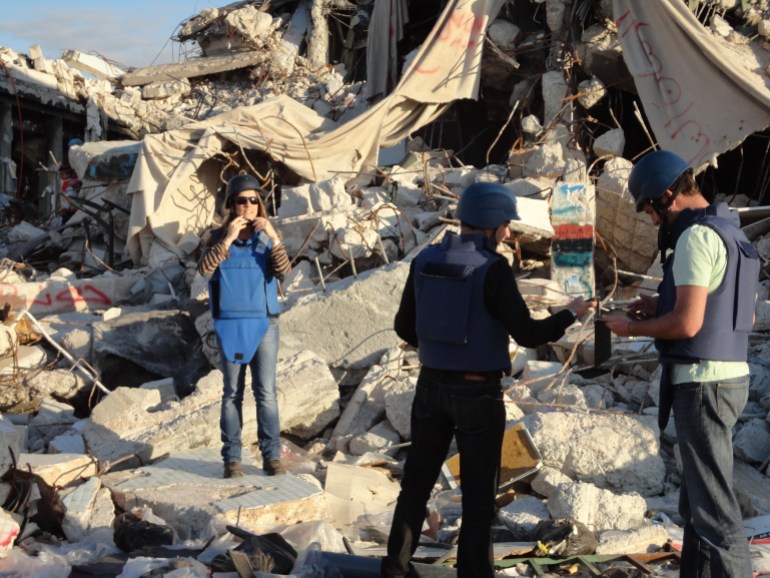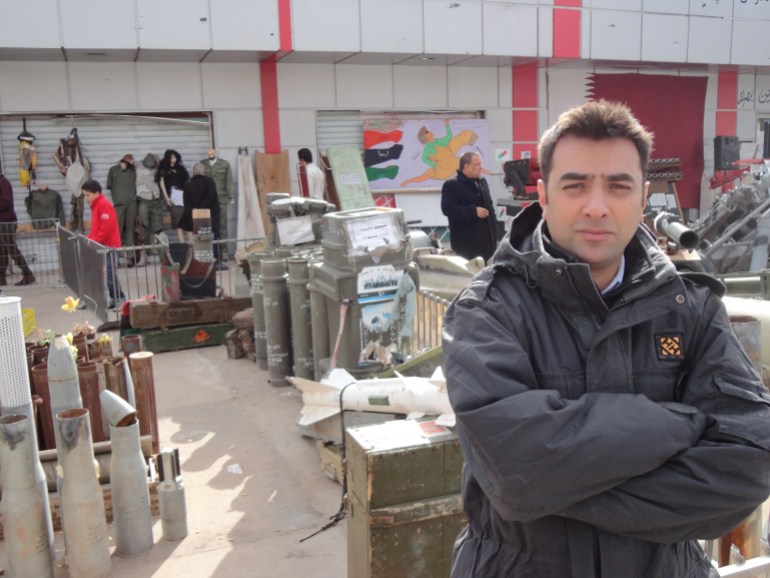‘Oil, arms sales, money’: What became of Libya’s revolution? | Arab Spring News
When the Arab Spring protests began 10 years ago, I was covering the Pakistani army’s war against the Pakistan Taliban. It seemed a world away from what I knew as the peaceful streets of Cairo and Tripoli.
In fact, when the protests began, my colleagues and I watched the news unfold on Al Jazeera in disbelief that it was happening at all.
The day of February 17 – now remembered as the Day of Revolt in Libya – began small. A few gathered in Benghazi, in eastern Libya, inspired by the uprisings in Tunisia and Egypt. Then, more people started to arrive. Within a few hours, there were thousands.
You would not have known it if you were watching Libyan State Television. The protests were ignored. The residents of Benghazi had another outlet, however: social media and the internet.
Over the next few days, videos were uploaded and hashtags were created, the most popular being #feb17th. In the capital, Tripoli, Gaddafi loyalists decided to have their own pro-regime celebrations and state TV rolled on live pictures of that for hours over the next few days. But it was too late.
Al Jazeera started to broadcast the pictures and posts from Benghazi almost as soon as people uploaded them. The Libyan protesters responded by putting huge screens up showing Al Jazeera in Arabic and English.
As the Arab youth began to realise they had a voice, it just grew louder and louder. Enough of the corruption, the nepotism and enough of their voices being silenced, they cried out loud. I knew I was witnessing history, and I wanted to be there.
A profound moment of change
I finally got my chance later in the year when I went to cover the aftermath of the revolution. Having seen the war unfold from afar, and heard the stories of those who had died, I was well aware of the cost common Libyans were paying for freedom. I wasn’t sure what to expect when I landed. What I found was a moment of profound change for Libya.
 Standing with camera crew on the rubble where Gaddafi’s compound, Bab al-Aziziya, once stood in Tripoli, in December 2011 [Photo courtesy of Imran Khan]
Standing with camera crew on the rubble where Gaddafi’s compound, Bab al-Aziziya, once stood in Tripoli, in December 2011 [Photo courtesy of Imran Khan]By December 2011, Libya was on the cusp of something big and beautiful. The war that had torn it apart was over and, among Libyans, there was a sense of optimism I hadn’t seen before. My crew and I would get into our car every day and, from Tripoli, explore as much of the country as we could. What we found was extraordinary. Politicians, artists, shopkeepers, restaurant owners – all seemed to be excited about the future.
Then we arrived in the town of Sirte. At the height of the war in August, Colonel Muammar Gaddafi had retreated to the coastal city and it was there that his fighters mounted a final stand on his behalf.
On October 20, 2011, one of the many militia groups fighting to be free of the Gaddafi regime, cornered the colonel and other members of his inner circle in Sirte and, after a fierce fight, captured and killed him.
Subsequent investigations have suggested that the militia acted in a manner that was illegal according to the Geneva convention. It is said they killed Gaddafi by beating him to death but accounts differ. We may never know for sure. In Libya, no one has ever been charged with any crime relating to the incident.
‘He feared they would kidnap us’
My crew and I arrived in Sirte in December of that year. Now, news can be a fussy business and can require someone with local knowledge – a producer, a camera operator, a driver. It’s a bit like being in a circus troupe travelling from place to place and being very visible once you get there. That day was no different but it is one moment of my time in Libya which I will never forget, despite only being in the city for less than 15 minutes.
We had been in the car for a few hours by the time we got there and it was good to get out and stretch our legs. I was looking forward to speaking to residents of Sirte and getting a sense of their hopes and dreams for the future.
It didn’t take long. We suddenly noticed several heavily armed vehicles driving around us. Our guide to Sirte was blunt: “Get out within 10 minutes and leave the city.” Otherwise, he feared they would kidnap us. The look in his eyes suggested he was deadly serious. We left in five minutes.
 In front of the Museum of War in Misrata in December 2011 [Photo courtesy of Imran Khan]
In front of the Museum of War in Misrata in December 2011 [Photo courtesy of Imran Khan]Looking back, I should have realised that was an omen, a sign that the future for Libya was as dark for some as it had seemed optimistic to others. The news out of Libya over the next 10 years became more and more fraught with armed power struggles taking place and then a war against ISIL (ISIS), which had seized an opportunity to recruit former Gaddafi loyalists as chaos reigned.
Powerful nations began to back and arm different factions. Broadly speaking, two powerful forces have since emerged.
One is the internationally recognised Government of National Accord, or GNA, backed by Turkey and recognised by the United Nations. The other is in Benghazi where it all began, where a powerful general has emerged. General Khalifa Haftar’s forces are supported by France, Egypt, Russia and the UAE.
In a curious twist of international relations, France, which is a member of the UN Security Council, backs a leader not recognised as the legitimate representative of Libyan people by the UN. You might ask yourself why and it’s a good question. The reason may well be one of French self-interest. The government in Tripoli has sided with Turkey, and France has longstanding and lucrative defence contracts with Egypt and the UAE.
That is now the balance of power in Libya and the country is as far away from a secure, stable future as it was in 2011.
‘No-one expects peace anytime soon’
Speaking to Libyans both in and out of the country, there seems to be a consensus emerging that the presence of powerful foreign forces backing their preferred partner is the biggest hindrance to peace.
I was last in Libya in 2016 and the sense of optimism I saw in 2011 had gone, replaced by resignation that this is simply the way it is.
 Looking out to the Mediterranean Sea at Misrata, Libya, in December 2011, at the end of a year that saw uprisings in February and the arrest and death of the country’s dictator in October [Photo courtesy of Imran Khan]
Looking out to the Mediterranean Sea at Misrata, Libya, in December 2011, at the end of a year that saw uprisings in February and the arrest and death of the country’s dictator in October [Photo courtesy of Imran Khan]Malik Almijea, who lost a leg fighting Gaddafi’s forces in 2011, now lives in Misrata and works as a personal trainer. I talked to him this week about the 10th anniversary of the revolution in Libya.
“In 2011, Libyans rose up and expressed themselves and revolted against a dictator. We wanted a democratic state, but the situation is not as we hoped it would be. It will take time. After 42 years of Gaddafi rule, I think it is normal that we are where we are. Let’s hope things get better,” he told me.
And while that may be a sentiment most can agree on, the way forward is less clear. As one Libyan youth told me this month: “Oil, arms sales, money. As long that is the ultimate equation, no one expects peace anytime soon.”


